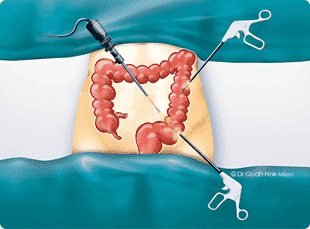Laparoscopic Colorectal Cancer Surgery
Benefits of Laparoscopic Surgery
Laparoscopic surgery is as safe as traditional surgery. Patients often experience less pain, a shorter recovery to normal activities, shorter hospital stay and less scarring with laparoscopic surgery. There is also a lower chance of wound infection and incisional hernia after laparoscopic surgery. The benefits of laparoscopic surgery are in line with our centre’s philosophy of minimal surgical downtime and maximal benefit. Laparoscopic surgery is performed routinely at our centre.
Conditions suitable for Laparoscopic Surgery
We performed most of the intestinal surgery using the laparoscopic approach, including laparoscopic surgery for colorectal cancer, appendicitis, gall bladder disease, hernia and inflammatory bowel disease.
Who is not suitable for laparoscopic surgery?
Most intestinal surgery may be performed using the laparoscopic approach. In colorectal cancer surgery, currently laparoscopic surgery for colorectal cancer is limited to patient with early stage cancer. Laparoscopic surgery will not be suitable in cases where the cancer is very advanced or has already invaded another adjacent organ. Laparoscopic surgery may not be suitable in patient who had previously undergone a major operation in the abdomen via a long midline incision. However, each patient’s clinical situation will definitely need to be reviewed on a case by case basis. Laparoscopic surgery is also not suitable for patient with severe cardiac or lung disease.
Patients who have already developed intestinal obstruction due to cancer would also normally be unsuitable for laparoscopic surgery. However, presently colonic stenting procedure is available and such obstructed patient may have the cancer stented to allow decompression of their colon. Thereafter, laparoscopic approach may be possible to be performed to remove the cancer.

